Chapter 14 DANCING GIRL 1949
Helen and Allan Thew had a large bush block of land at Lugarno and were living in a two-roomed "cabin" with a separate room at the back which Mum arranged for us to have. It was rent-free in return for minding their four-year-old son, Philip. There was a tank for water and a chip-heater in the bathroom/laundry for weekly bathing and washing. They thought of subdividing later and selling one block so that they could build a house without a lifelong bank loan. They had plans for a permanent home, perhaps an adobe house using mud from their land to make bricks. They also considered a solar hot water system, a new idea which did not seem unrealistic when Allan explained it. There was quite a lot of sandstone on the block and Allan was quite skilful at cutting it for landscaping. He also felled an occasional tree for fire wood. His work was casual and irregular, Helen's wage was modest but more steady.
The block was covered in natural bush and velvety flannel flowers except where Helen had planted Tiger Lilies around the eucalypts. At the back, it fell steeply to the northern bank of George's River.
Our room was bigger and in very pleasant surroundings and at times we heard possums running on the roof. This inspired me to write about possums and another about baby-sitting for which I also got certificates from the Argonauts.
I also wrote an article, (later printed in ABC Weekly in January 1950).
Trigger Plants
"About a month ago we moved to Lugarno, and we are now living among very beautiful surroundings. The flannel flower season is nearly over, but when we first arrived the show was beautiful - a whole hillside swaying and dancing with a thousand flannel flowers. There are many other wild flowers too but in not nearly such profusion. There are trigger plants and Christmas bush.
The trigger plants are fascinating. If you touch the centre of the flower with a tiny stick, a trigger shoots up. This is the plant's way of scattering its pollen to other flowers. Insects climbing upon the flower are hit by the trigger and covered with pollen which they then carry to the next flower.
Our house is actually a long way from the river, but the property runs right down to the water front. I often sit on a rock, high over the water and watch the fishermen throw out their lines, or the launches chugging to and fro."
This earned another Certificate.
We now lived even further from the school (although I was closer to my father and brother) and I had to leave home even earlier each morning. I walked about a mile to the bus stop, caught the train at Hurstville, changed at Central to the Wynyard line and walked along Bradfield Highway to school. My school case was full of heavy books. My back aches got worse but I saw no escape from that. And at night I still kept myself awake for hours re-enacting an imaginary adventure, tossing and turning when it became exciting and of course still had to get up early when the alarm rang. Any anticipated break in the routine of my life was lived many times before the event. The reality was often less satisfying than the shadow. I was always fearful of making faux pas. I also worried about trivial, idle remarks and wondered what people thought of me. I was afraid that I would say something foolish to my friends and often rehearsed situations trying to think of witty replies, or anticipated problems and tried to plan solutions and avoid embarrassment.
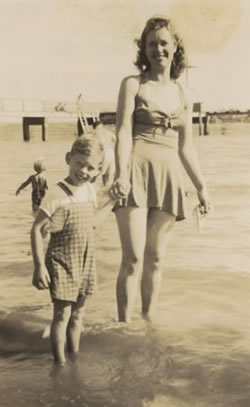
Helen and Philip
The intention was that Mum would mind Philip in lieu of paying rent. But it was not long before she found it too much and frequently other arrangements were made among the neighbours or Allan had to stay at home. During the holidays I did a lot of childminding, but was not available during school time. There was no-one from school nearby, but I went out to the pictures when I could with Helen and became very fond of Philip, whom I called "possum". On the bus to Hurstville I met Penny who attended the Conservatorium of Music and whose family had moved to Lugarno. Like me she was the only student from her school in the area and we sometimes travelled together as far as Central and occasionally went to a show or concert. My music lessons had come to an end when I had left school at the end of third year.
At the half-yearly exams I did badly in general and was mortified on being "put down" in some classes. The theory was that I would have trouble "keeping up" with the harder work and competing with the more advanced students. My maths report said "Dorothy will improve these results when she has more faith in herself." For whatever reason my results did improve by the end of fourth year. My French teacher, Mrs Patterson said "Try to take a long term view. It is better to enjoy life, some sport, some social life. Don't sacrifice everything for the sake of prestige. Test results aren't everything."
But during the last three years we had been too well inculcated with the principles of competitiveness. Our places in class were important to us, we each accepted what we came to perceive as our rung on the ladder in each subject and usually performed nearly to it. A slight gain was a triumph, a drop was a tragedy. In fourth year Christina and Elizabeth who generally were first and second in the year had a lapse and one of them came third. She was in tears, having "failed". I felt embarrassed for her. She was expected to be first or second and had not lived up to the expectation.
One day I received £2 from The Smith Family. Mum thought that maybe one of the teachers had wanted to make an anonymous gift and had chosen this way to do it, via a group of generous businessmen. Of course it was soon gone!
Using material I had bought while working, I made myself a plain blue dress with a fitted bodice and full skirt which needed some trimming so Helen drew across the bodice a pattern of leaves and berries which I embroidered in white. I felt it looked very smart and was certainly an original. Mum was quite amazed at what I could do, as she was unable to help with dressmaking. Paper dressmaking patterns and knitting books were expensive so I learnt to share with others and adapt and reuse a basic design many times. Mum had taught me basic knitting, crochet and sewing but was quite baffled by the complicated patterns which I now enjoyed. She admired the result, seeing the developing skills and confidence I acquired.
When Mum was in hospital I slept in the bed rather than the stretcher which went underneath. I often had meals with Helen and Allan. When Mum came home she was put on a trial diet of rice for a period, cooked without salt or anything else. She tried to follow the doctor's directions in the hope of improving her health. Until then we had always been health conscious with the limited knowledge then available. Meat and three vegetables was the norm. Occasionally on a hot day we shared a picnic meal with Helen and Allan and Mum and I joined them in a shandy of home-made beer and lemonade. They were very good company and I enjoyed sharing things with them.
Helen had an eye for style. I admired her very much when she was dressed up to go out. She became a mother-figure to me and I was influenced by her opinions and bright personality.
At school I heard the other girls talking about parties, picnics and visiting each other. Some of them had telephones and could ring and help each other with homework. Most of them had a "best friend" who lived in the same area. Since leaving Bankstown I had never lived near my classmates so rarely saw any of them out of school hours. Now I lived even further out of the school area so did not get invited to join many activities. I was generally overlooked except by a few (Pat and Elizabeth) and always felt left out. Elizabeth and her family had moved to Ryde, to a bigger house with a tennis court, where she had tennis parties from time to time. It was a long way for me to go, involving a walk, a bus, train to Central, another train to West Ryde and another walk. I once invited a lot of the girls for a picnic at Lugarno. The day turned out very dull and only a few came. I was so discouraged.
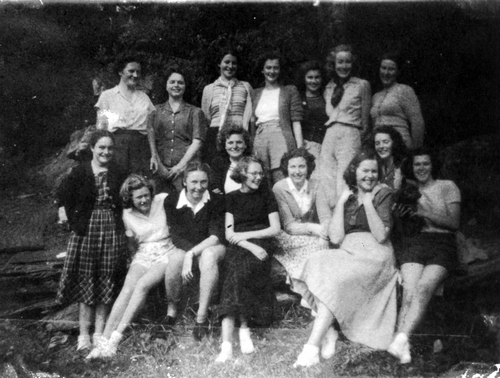
Fort Street Girls and Fort Street Boys combined for dances. I had bought some pale mauve satin for a top and deeper mauve taffeta for a skirt for a street (ballerina) length dress for the school dances. We wore full skirts over stiff petticoats which gave a beautiful rustling and swaying effect as we moved. These dances were held at the boys' school hall at Petersham and it was difficult to get home to Lugarno especially at night so I had to arrange to stay overnight with someone. "Pops" was sprinkled on the floor to make it a little slippery and suitable for dancing. The girls sat on seats along three walls, with the band on the stage. As part of their training the boys were required to ask a variety of girls to dance, not only the pretty ones who knew how, but to see that nobody sat out too frequently (was left to be a "wallflower"). Taller girls had a problem. Being average height and build, having a good sense of rhythm and able to pick up the steps easily was largely a matter of having chosen the right parents. I rarely had to sit out. But like all beginners I needed practice for confidence. Dancing to lively music was the most exhilarating feeling possible.
At a set time during the evening supper was served, soft drinks and sandwiches or biscuits. This was a chance to move around.
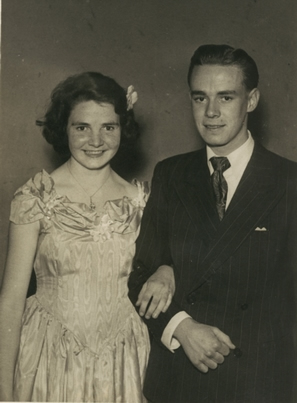
There was also an annual ball held at the boys' school. I asked my cousin Clyde, Uncle Viv's youngest son to take me to the ball for which a long gown and a partner were required. It was embarrassing to have to ask and necessary to go to Pennant Hills in order to ask him. I was invited to stay at Pennant Hills after the ball. My cousin Kathleen offered me her old evening dress, deep purple, which surely looked stunning on her, as she was elegant and confident, but I felt was too dramatic and dark for me. Instead I had borrowed a pale green taffeta dress with pink flowers around the neck. Nobody wore anything provocative or daring. The evening was most enjoyable. I was so enthusiastic about dancing I determined to go to the school centenary debutantes' ball the next year and put my name down. My brother aged fifteen did not dance and I wished I knew more boys especially local ones that I could ask to go to such social events. It never worried me to ask directions, and I often went places alone but it was agonising to have to find a dance partner. The ideal would be to have an older brother or maybe even a steady boyfriend. My friend Grace Mackintosh was planning to get married soon and would then have a regular partner and I envied her. If only...
Marriage presented an escape from the need to find dancing partners. It promised a stable home, a place where I could invite people, security, love and a sense of belonging, but marriage was a distant dream. No-one had ever taken one passionate look at me, let alone tried to sweep me off my feet as I imagined. No-one had ever even asked me out. In fact I didn't even know any unrelated boys.
Helen said that twenty-five was a good age to think of marriage. "You should be old enough then to know your own mind." This seemed an absolute eternity.
In "Hamlet" we read "This above all to thine own self be true." We learnt it was hypocritical to feign acceptance of things we could not believe. To me the limited set of beliefs and dogma of Jehovah's Witnesses and my mother could not explain many things especially the age of fossils and rocks. Mum's reply was "We don't understand God's plan. We just have to accept it and have faith." I did not press her for answers as that would seem that I was trying to undermine her convictions. She needed her beliefs to give her life a meaning. The ideas that did not fit her existing convictions were dismissed and questions she could not answer were not to be asked.
For me, life was developing with new experiences and concepts, occasionally new friends and places to go. Technology was expanding man's knowledge of the world, the cosmic, the microscopic, the prehistoric. These things fascinated me, but at the time they did not present themselves to me as possible career choices.
Mum seemed to have no curiosity about such matters. She had passed on a love of literature and had enough in her life without thinking about the dating of geological specimens or prehistoric tools or fossils. It was as mysterious as chemistry or German and the bible had nothing to say on these topics. The subject did not arise.
I made myself school blouses and a tartan suit which the girls seemed to like. They expressed amazement that I had made it myself. They thought I was very clever being able to make my own clothes. This was very important to me. Mostly their mothers or grandmothers did this for them, giving the girls time to study and have time to enjoy hobbies such as tennis. My hobbies were reading, knitting and sewing and writing if I had time.
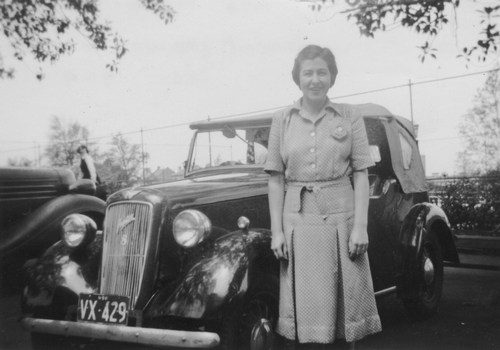
Sic transit Gloria Mundi the day we learnt she was leaving Dec 49
At the end of 1949 Miss Watkins, our chemistry teacher was transferred. We felt devastated, especially Olwyn who was fanatical about chemistry. Miss Watkins was young and lively, and we "hero-worshipped" her. She had been the first teacher to acquire a car, which she parked in the playground near the fig trees. Her name was Gloria. She wrote in my autograph book "Sic transit Gloria mundi." [So passes the glory of the world.] When I told Mum about the transfer she said "Be glad you have known her and be happy for her if she has been promoted." I passed on Mum's philosophy to my friends as if I was displaying my own maturity in my acceptance of the inevitable. Perhaps a little of her way of thinking was absorbed if not entirely comforting.
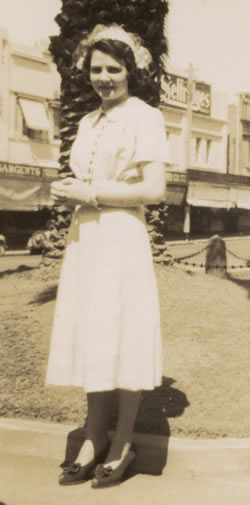
Fourth year students gave a Farewell Party to fifth year. We were allowed to wear our best clothes, preferably new, for the event. I made a pale green dress with tiny navy spots and a hat based on a June Millinery shape. The new captain and prefects were elected and invested.
It was disappointing not to be elected a prefect, but it was quite unrealistic to hope for, as I was always far in the background in any group, except in sport at which I did quite well. There had been meetings of committees to organise the entertainment, the afternoon tea, decorations and a cake. Someone's mother offered to make and decorate a large cake. The art students made and illustrated place cards. Our new captain was Elizabeth who had to make her first speech at the party. The day ended for fifth year at five o'clock after dancing in the gym, when fourth year had to tidy up and do the washing up.
My outfit was suitable to wear again soon after when Uncle Eric, having obtained a divorce, the first in the family, married a woman of his own age (late 40s) who had not previously been married. She became a very supportive wife.
Having done well at Maths I was allowed, even encouraged to do two Maths (algebra, calculus, trigonometry, geometry, and co-ordinate geometry) for the Leaving. My best subjects were English, French and Chemistry. My German teacher was always understanding and forgiving of my failure to do my German homework and so my results were never very good. She would say "Never mind dear, do what you can." Whereas my French teacher said "Do it as soon as you can."
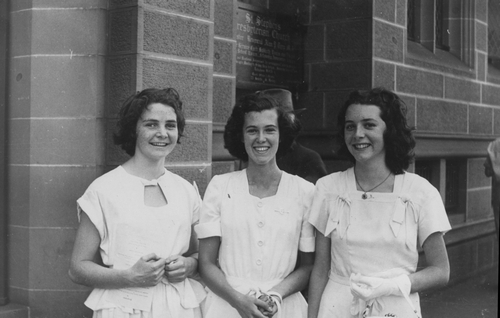
Dorothy, Heather and Joy. Speech Day 1949
NEXT >>

 Helen and Philip
Helen and Philip

 Sic transit Gloria Mundi the day we learnt she was leaving Dec 49
Sic transit Gloria Mundi the day we learnt she was leaving Dec 49
 Dorothy, Heather and Joy. Speech Day 1949
Dorothy, Heather and Joy. Speech Day 1949



